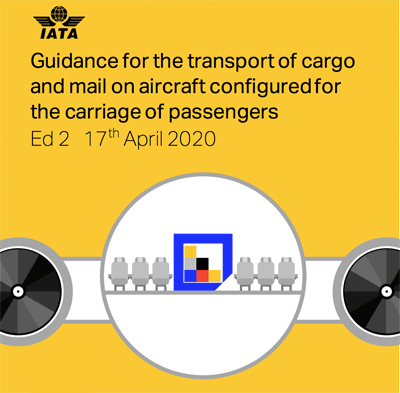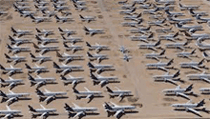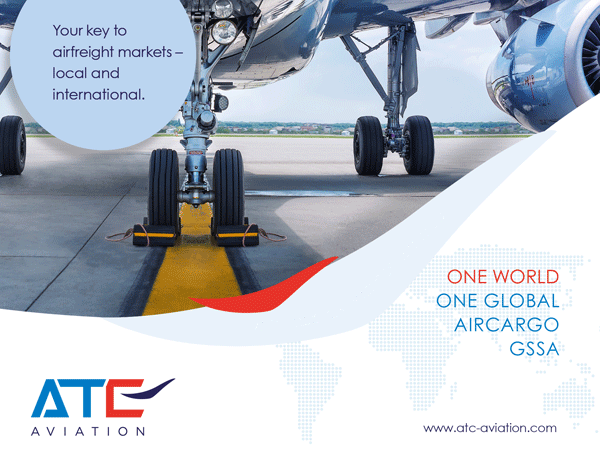

 Hello
Geoffrey, Hello
Geoffrey,
I hope this message find you, your family and your readers well
and safe during this most distressful time.
In your piece on “Rationalizing
Nationalizing Airlines” April 28, you rightly mention the
safety considerations that carriers must assess when considering
utilizing passenger seats for the carriage of cargo or even cabin
seat removal. These are great innovative solutions designed to address
the need for greater capacity to move critical cargo around the
planet.
To support the carriers in this regard
IATA has indeed been working with aircraft manufactures and regulators
to develop some guidance material which commences with a safety
risk assessment. Your readers may be interested to know that this
guidance material, updated weekly as regulatory guidance evolves
can be accessed here,
or by clicking image above.
Wishing you all well.
 Brgds, Brgds,
Glyn
Glyn Hughes
Global Head of Cargo
IATA
Good going, Glyn . . . Wish somebody could come up with a cure
for COVID-19 as fast! g

Qatar Airways Cargo said it joined
the International Freight Assistance Mechanism (IFAM) an initiative
by the Australian Government to help restore critical global supply
chains for high-value Australian agricultural and fisheries producers,
who have been heavily impacted by COVID-19 containment measures
around the world. Through this initiative, the Australian
Government is helping cover the cost of airfreight – reducing
airfreight and freight forwarding costs for exporters and other
measures for businesses and exporters.
“Air cargo is crucial during times of crisis and
we are glad to support the Australian Government and businesses
in the fight against the pandemic,” Qatar Airways Group Chief
Executive, His Excellency Mr. Akbar Al Baker said, adding:
“Through our passenger flights and freighters
from Australia, we are offering registered exporters over 750 tons
of cargo capacity each week for their high value fresh produce.
“In times of crisis, we need to be able to adapt
quickly and we are proud to be part of this initiative that supports
global trade.”
“Through IFAM’s mechanism, QR Cargo is offering
block space capacity and charters for Australian exports from Melbourne,
Sydney and Perth,” QR Cargo said.
“For other destinations including Brisbane and
Adelaide, trucking options are available.” More click here.
Finnair
Sends Out The Pasi
 “It
has been interesting and challenging, but at the same time it has
been great to see how the Finnair spirit can be seen and felt in
the organization,” declared Pasi Nopanen, Finnair Cargo Asia
Sales Director. Based in Shanghai, Pasi has been on the job for
about a month now. “It
has been interesting and challenging, but at the same time it has
been great to see how the Finnair spirit can be seen and felt in
the organization,” declared Pasi Nopanen, Finnair Cargo Asia
Sales Director. Based in Shanghai, Pasi has been on the job for
about a month now.
“Working from home has been quite easy for me
as it's something I've done quite a lot in earlier roles,”
Pasi said.
“It also helps that my daughters are already adults, so home
schooling is not an issue for us.
“The modern tools available make homework quite
easy and effective.”
Actually, Pasi has flown the Finnair aerial highways
previously as AY, where he made his early mark in air cargo before
joining Etihad and later Qatar Cargo.
Back where it all began feels like a sentimental journey,
as right now the Helsinki-based carrier operates cargo-only flights
into Asia.
“I feel privileged to work with the cargo-only
flights,” Pasi said.
“It has felt counterintuitive that during this
extremely exceptional time we have been busier than ever in cargo
sales.
“There is a lot of demand and many requests for
cargo capacity currently and we are doing our best to answer those
needs,” Pasi assures. |

 Southwest
reported disastrous numbers this week losing $95 million in Q1 while
saying May numbers do not look much better. “A crisis unprecedented
in our history,” said CEO Gary
Kelly
. . . Word
up and down the line is that COVID-19 will result in carriers becoming
smaller, as airline management is currently creating scenarios that
include voluntary early retirement; leaves of absence; cuts in pay
and benefits in an effort to mitigate furloughs. “Good luck”
is the expected first response from the pilot’s union, which
traditionally insists on “full pay to the last day.”
. . . In America the U.S.
Government has provided funding that will carry
the ball for its flags until September
. . . What emerges after that is: best case scenario—people
return to flying, worst-case scenario—might include airlines
invoking the Force Majeure “Act of God” clause in negotiations
. . . In America
where a 75% load factor is needed for flights to break even, right
now everybody is taking a beating in a system that just a few months
ago looked like it had a license to print its own money
. . . Now as May 2020 begins, almost overnight with
merciless speed and taking no prisoners, the COVID-19 Pandemic has
created a defacto nationalized air transport system in America. Southwest
reported disastrous numbers this week losing $95 million in Q1 while
saying May numbers do not look much better. “A crisis unprecedented
in our history,” said CEO Gary
Kelly
. . . Word
up and down the line is that COVID-19 will result in carriers becoming
smaller, as airline management is currently creating scenarios that
include voluntary early retirement; leaves of absence; cuts in pay
and benefits in an effort to mitigate furloughs. “Good luck”
is the expected first response from the pilot’s union, which
traditionally insists on “full pay to the last day.”
. . . In America the U.S.
Government has provided funding that will carry
the ball for its flags until September
. . . What emerges after that is: best case scenario—people
return to flying, worst-case scenario—might include airlines
invoking the Force Majeure “Act of God” clause in negotiations
. . . In America
where a 75% load factor is needed for flights to break even, right
now everybody is taking a beating in a system that just a few months
ago looked like it had a license to print its own money
. . . Now as May 2020 begins, almost overnight with
merciless speed and taking no prisoners, the COVID-19 Pandemic has
created a defacto nationalized air transport system in America.

. . . Elsewhere,
as numbers underscore that 64% of the world’s airline fleet
remain grounded, adding up to 17,000 jets idled by the coronavirus
. . . Reportedly Avianca
Colombia is on the verge of bankruptcy
. . . In the Middle East, Emirates
Airline reportedly has grounding of aircraft extended
until July 1, 2020 . . . Air
New Zealand’s plan to launch the world’s
longest flight between New Zealand
to London in a 25-hour
jump via its B787s is back in the drawer until at least mid-2021
. . . American Airlines
took delivery of a brand new B787 and immediately
moth-balled the aircraft to Tulsa, Oklahoma where it sits today
parked in Tornado Alley
. . . Meantime Boeing
is cutting aircraft production of its B787
from 14 to about 7 aircraft a month. There have
been 1,500 B787s ordered and about 1,000 delivered. B737
Max production is supposed to resume in May, awaiting
final FAA certification . . . If
you wonder why anybody would want to accept, and then park an aircraft,
that reasoning has to do with fines and charge backs an airline
must endure for cancelling orders. So, during a time when the last
thing any airline needs right now is another airplane, economically
it is “cheaper to keep her.”
. . . Boeing
laying off 10% of its workforce as Q1 figures were released this
week is no surprise.The surprise is the company laying off blame
on COVID-19. “Boeing’s revenues for Commercial Aircraft,
declining from US$11,822bn to US$6,205bn year-on-year and featuring
US$2bn in operating losses, could be foreseen from the recent succession
of cancellations that stroke Boeing’s backlog, especially
the B737,” Nicolas Jouan, Aerospace and Defense Analyst at
GlobalData said. Boeing has a bright spot, as the B777X
is flight testing, moving closer to delivery of the first of its
309 orders to Lufthansa in 2021. But this is subject to change as
Lufthansa, like
every airline is currently in a challenging financial situation.
The B777X orderbook
doesn’t get any better, as Emirates
Airline, next in line to get the new aircraft has
grounded all of its A380s and as mentioned here has delayed bringing
any aircraft back into service until July 1
. . .
|







